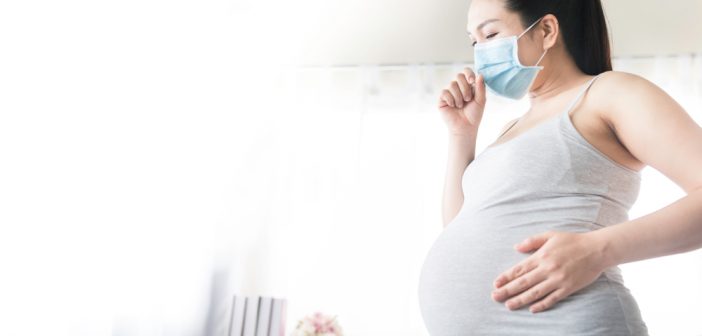Laura Moro, experienced biomedical researcher and science writer, discusses the effect of COVID-19 on pregnancy and maternal health.
Coronavirus disease 2019 (COVID-19), caused by severe acute respiratory syndrome coronavirus 2 (SARS-CoV-2), continues to escalate worldwide, with Europe and the USA now the epicentres of the pandemic. As of April 15, there are almost two million declared cases and over 123,000 deaths globally, with many countries undergoing community transmission (1). Although a majority of infections with SARS-CoV-2 are mild, the elderly and people with comorbidities−including cardiovascular and respiratory diseases, hypertension, diabetes, and cancer− are at increased risk of severe disease and death (2,3).
Pregnant women are particularly vulnerable to several infectious diseases that can cause both maternal and fetal adverse outcomes (4–6). Immunological and physiological adaptations occurring during gestation are behind this increased risk (7). During previous outbreaks caused by SARS-CoV and Middle East Respiratory Syndrome CoV (MERS-CoV), several pregnant women acquired the infection. SARS-CoV −a ‘cousin’ of SARS-CoV-2− was associated with severe maternal illness, maternal death, spontaneous abortion, severe intrauterine growth restriction, preterm delivery, and life-threatening gastrointestinal complications in the newborn (8). Among the few known cases of MERS-CoV-infected pregnant women, several maternal and neonatal deaths and stillbirths were reported (9).
The scientific and medical communities are putting an immense effort into sharing information about COVID-19. There are currently more than 20 published case reports and case series presenting pregnant women infected with SARS-CoV-2 and a few case-control studies, a majority of them from China. Pregnant women appear to show a similar disease presentation than their non-pregnant counterparts, being fever and coughing the most frequent symptoms (10). There is no evidence for vertical transmission of the virus from infected mothers to the fetus (11), although a few neonates tested positive a few hours after birth (12,13). Several maternal and fetal adverse outcomes have been reported, including preterm delivery, fetal distress, low birth weight, and respiratory symptoms in the newborn, among others (10,14). Preterm delivery, the leading cause of death in children under five, appears as the most common adverse pregnancy outcome caused by coronaviruses (15). Thus, future mothers should be considered in prevention and treatment strategies against COVID-19, ensuring the safety of drugs and vaccines during pregnancy.
Pregnant women and neonates in low-resource settings, as well as refugees and those in conflict zones, constitute one of the most vulnerable populations, and concerted efforts are urgently needed to ensure their health and wellbeing. Health service delivery−including, for example, malaria chemoprevention for pregnant women−should be guaranteed during the pandemic, avoiding the disruptive effect of previous disease outbreaks (16).
The WHO, as well as other international organizations and national health authorities, have issued interim recommendations for the care and management of SARS-CoV-2-infected pregnant women (17). These recommendations advise against unnecessary caesarean deliveries and encourage breastfeeding if possible. Although we still have little data on the impact of COVID-19 on pregnant women and neonates, systematic screening and careful follow-up of any suspected SARS-CoV-2 infection during pregnancy is crucial to ensure maternal health.
Laura Moro, PhD, is a researcher and science & health writer. She is particularly interested in infectious diseases, global and planetary health. She conducted research for several years on infectious diseases affecting pregnant women in Sub-Saharan Africa. HIRE LAURA
Need to consult a coronavirus expert? Speak with COVID-19 researchers directly on Kolabtree. Hire scientific writers for help with verifying information and scientific writing. Contact experts in pregnancy and childbirth. Get started now
References
- World Health Organization. Coronavirus disease 2019 (COVID-19) Situation Report-86 (April 15).
- Yang J, Zheng Y, Gou X, Pu K, Chen Z, Guo Q, et al. Prevalence of comorbidities in the novel Wuhan coronavirus (COVID-19) infection: a systematic review and meta-analysis. Int J Infect Dis. 2020 Mar 12.
- Wu Z, McGoogan JM. Characteristics of and Important Lessons From the Coronavirus Disease 2019 (COVID-19) Outbreak in China. JAMA. 2020 Feb 24.
- Thompson JM, Eick SM, Dailey C, Dale AP, Mehta M, Nair A, et al. Relationship Between Pregnancy-Associated Malaria and Adverse Pregnancy Outcomes: a Systematic Review and Meta-Analysis. J Trop Pediatr. 2019 Oct 10.
- Shi T, Huang L-J, Xiong Y-Q, Zhong Y-Y, Yang J-J, Fu T, et al. The risk of herpes simplex virus and human cytomegalovirus infection during pregnancy upon adverse pregnancy outcomes: A meta-analysis. J Clin Virol. 2018 Jul;104:48–55.
- Mertz D, Geraci J, Winkup J, Gessner BD, Ortiz JR, Loeb M. Pregnancy as a risk factor for severe outcomes from influenza virus infection: A systematic review and meta-analysis of observational studies. Vaccine. 2017 Jan 23;35(4):521–8.
- Kourtis AP, Read JS, Jamieson DJ. Pregnancy and Infection. N Engl J Med. Massachusetts Medical Society ; 2014 Jun 5;370(23):2211–8.
- Wong SF, Chow KM, Leung TN, Ng WF, Ng TK, Shek CC, et al. Pregnancy and perinatal outcomes of women with severe acute respiratory syndrome. Am J Obstet Gynecol. 2004 Jul;191(1):292–7.
- Alfaraj SH, Al-Tawfiq JA, Memish ZA. Middle East Respiratory Syndrome Coronavirus (MERS-CoV) infection during pregnancy: Report of two cases and review of the literature. J Microbiol Immunol Infect. 2019 Jun;52(3):501–3.
- Zaigham M, Andersson O. Maternal and Perinatal Outcomes with COVID-19: a systematic review of 108 pregnancies. Acta Obstet Gynecol Scand. 2020 Apr 7.
- Karimi-Zarchi M, Neamatzadeh H, Dastgheib SA, Abbasi H, Mirjalili SR, Behforouz A, et al. Vertical Transmission of Coronavirus Disease 19 (COVID-19) from Infected Pregnant Mothers to Neonates: A Review. Fetal Pediatr Pathol. 2020 Apr 2;1–5.
- Zeng L, Xia S, Yuan W, Yan K, Xiao F, Shao J, et al. Neonatal Early-Onset Infection With SARS-CoV-2 in 33 Neonates Born to Mothers With COVID-19 in Wuhan, China. JAMA Pediatr. 2020 Mar 26.
- Dong L, Tian J, He S, Zhu C, Wang J, Liu C, et al. Possible Vertical Transmission of SARS-CoV-2 From an Infected Mother to Her Newborn. JAMA. 2020 Mar 26.
- Li N, Han L, Peng M, Lv Y, Ouyang Y, Liu K, et al. Maternal and neonatal outcomes of pregnant women with COVID-19 pneumonia: a case-control study. Clin Infect Dis. 2020 Mar 30.
- Di Mascio D, Khalil A, Saccone G, Rizzo G, Buca D, Liberati M, et al. Outcome of Coronavirus spectrum infections (SARS, MERS, COVID 1 -19) during pregnancy: a systematic review and meta-analysis. Am J Obstet Gynecol MFM. 2020 Mar 25;100107.
- World Health Organization. WHO urges countries to ensure the continuity of malaria services in the context of the COVID-19 pandemic [Internet]. [cited 2020 Apr 2]. Available from: https://www.who.int/news-room/detail/25-03-2020-who-urges-countries-to-ensure-the-continuity-of-malaria-services-in-the-context-of-the-covid-19-pandemic
- World Health Organization. Clinical management of severe acute respiratory infection when COVID-19 is suspected. Interim guidance. 2020.








